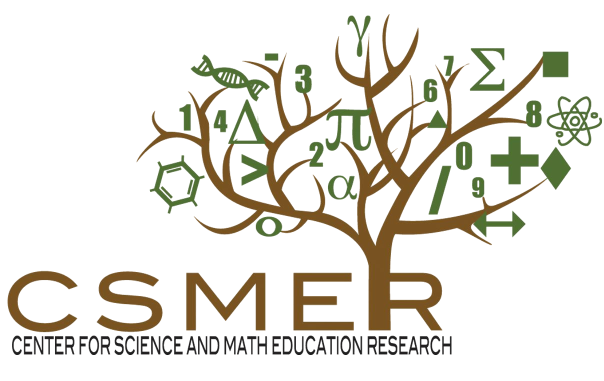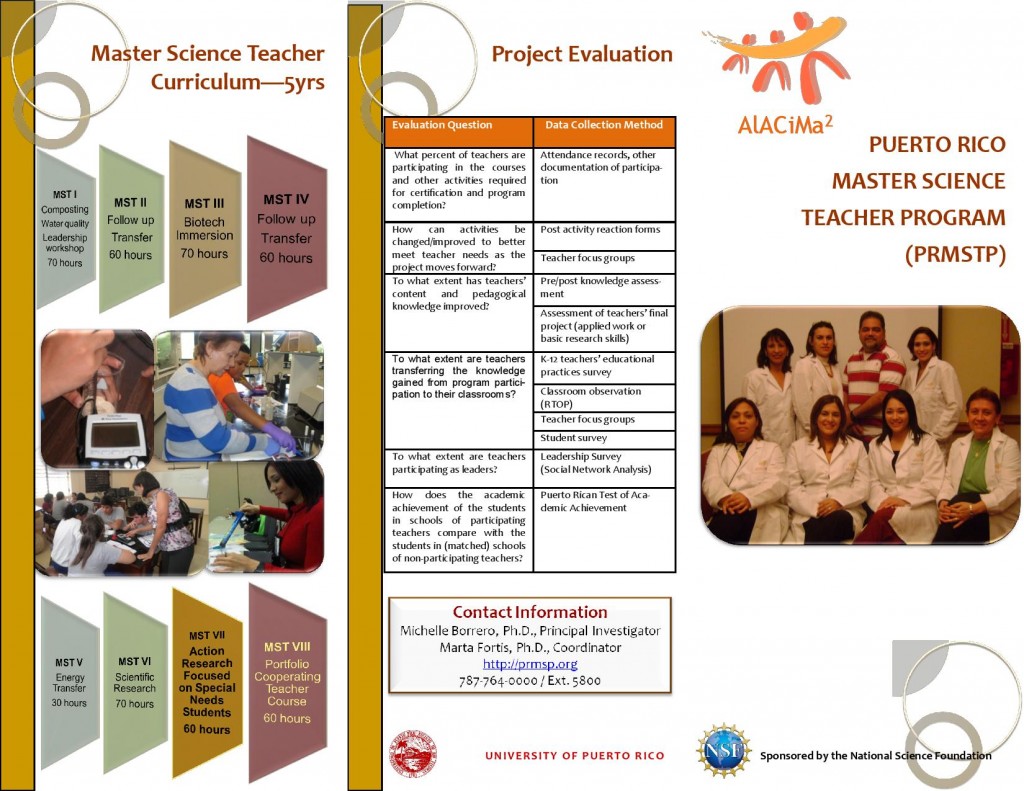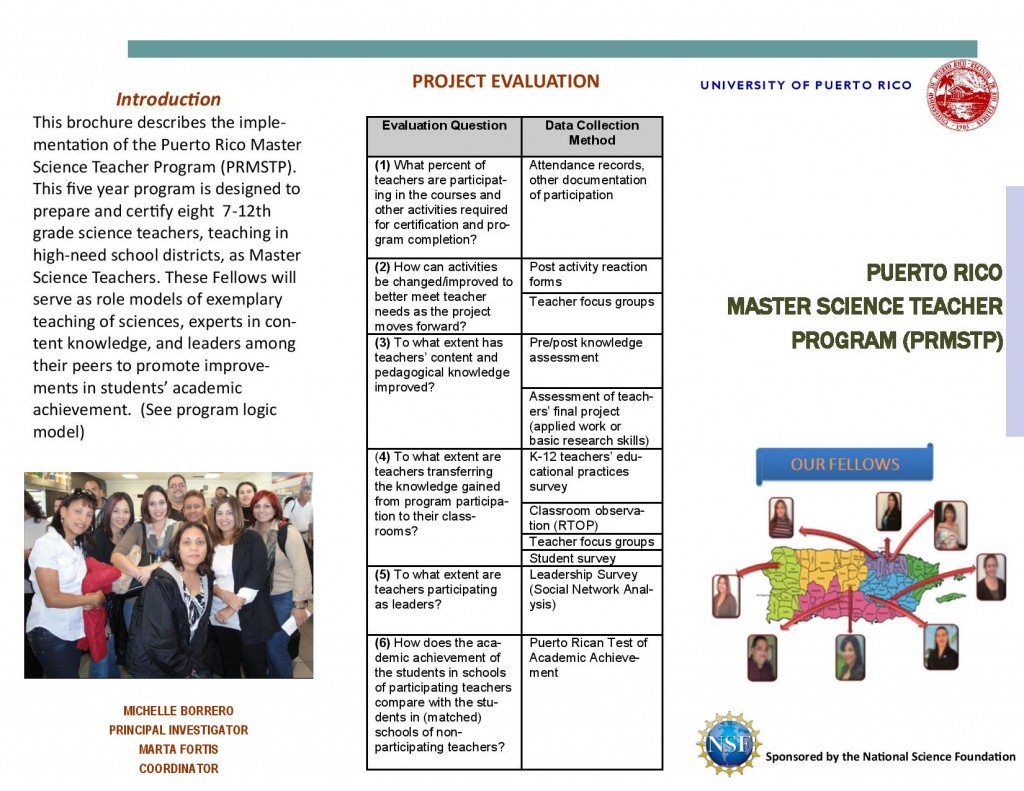Master Science Teacher
Opúsculo:
PR Math & Science Partnership (AlACiMa)
Master Science Teachers Certification Program
Overview
Master Science Teachers Certification is developed to ensure that there are teachers with special training to work with students and other teachers to improve student science performance. It is in response to a demand for science educators who can teach investigative methodology and techniques and equip students with the skills necessary to make informed decisions about issues and problems of a scientific nature.
The importance of Master Teachers has been recognized nationally. The 2000 report Educating Teachers of Science, Mathematics, and Technology calls for the presence of “master/mentor teachers in partner school districts who would have adjunct appointments with the schools of education or the departments of science, mathematics, or engineering [and who] would take on a significant role in the mentoring of future teachers during their practicum experiences.”
By definition, Master Teachers have experienced years of successful teaching and are widely recognized for their educational leadership. Master Teachers will be extremely knowledgeable and skilled, will have strong credentials in public school teaching, and may be involved in conducting research. We expect the use of Master Science Teachers (MST) as a component of the Puerto Rico Department of Education Science Program and as mentors in the teacher preparation program.
Some of their expected roles are
- teaching methods and content classes
- mentoring preservice and beginner teachers to provide expertise and model effective and efficient classroom instruction.
- redesigning existing course curricula and developing new courses
- designing and giving professional development workshops
- giving numerous workshops and presentations at local schools as well as at state, regional, and national meetings.
MST Curricula
The MST will be awarded by the UPR-RP’s Continuing Education Program when the teachers approve satisfactorily a sequence that consists of two phases that includes 8 sections totaling 425 hours.
|
MASTER SCIENCE TEACHER CERTIFICATION |
|
|
Dates |
Activities/ Courses |
| Second Semester 2008-2009 | Offer orientations and select the six 7-12 grades science teachers that will participate in the project. |
|
FIRST PHASE : WORKCOURSES (SMT I- SMT IV) Will focus on the enhancement of the Master Teachers’ mastery of science content and pedagogical skills through an approach that integrates depth of conceptual understanding with content-specific teaching strategies, and mentoring skills. |
|
| Summer 2009 | SMT I: First immersion and residential science content course (70 hours in two weeks)The course will include extensive hands-on inquiry and experimental activities. Novel forms of student assessment for understanding will be modeled and the basics of successful learning communities will be experienced. |
Composting & Water Quality – 4 capacitators
Leadership workshop – 1 capacitator
Academic Year 2009-2010 SMT II: Follow up and transfer to the classroom; deepening conceptual understanding of the scientific concepts studied in the summer and coaching for transfer to the classroom. (60 hours follow up on Saturdays). – 4 capacitators
Leadership Workshop – 1 capacitator
Summer 2011 SMT VI: Two-week residential immersion scientific research course where they have to carry out a complete scientific research project at the grade level they teach. (70 hours)Participants must present a portfolio that evidences their performance based on a set of criteria of teaching effectiveness through student learning outcomes. Each Master Teacher will be required to carry out two special projects, one on improvements made in their professional development they achieve in their educational practice, and another on the impact of their improved educational practice on their students from high need schools, particularly students with special socio-cultural and educational needs. The portfolio and the special projects will be assessed by a team of math/science specialists and educators using criteria derived from the national and local professional standards for teachers. They will also be encouraged to make a presentation at a national science meeting – 3 capacitators
Academic year 2011-2012 SMT VII: Continue “practicum” for the last two semesters (60 hours follow up) – 3 capacitators
Summer 2012 SMT VIII: One-week activity where teachers will share what they have learned with other teachers and are evaluated by science and education faculty for recommendation to receive the MCT certificate. (35 hours) – 3 capacitators
University and Community Connection
Master Teachers serve as a bridge between the university program and the local public schools. Because they have extensive experience in schools and in school districts, they understand how these systems work.
The university teacher preparation program will assign students in their pre practicum to observe the Master Teacher in their classroom. Also the Master Teacher will be certified as a teacher cooperator and will have assigned a practicum student. If it possible the Master Teacher will be its mentor when the student became a beginner teacher.
The University College of Education will have sufficient data to develop educational researches.
Attributes of a Master Science Teacher
- Innovators and Creators
Master Teachers are successful at moving beyond the textbook, which often becomes the curriculum. They are able to take risks, study student responses, and make changes as necessary. They have experience in being creative in real classrooms. They know how to ask probing questions to elicit what students are thinking, guiding them to generate their own questions.
- Interpersonal Skill
Interpersonal skills are vitally important. Master Teachers may be called upon to represent their school and university. They need to relate to and work with a wide variety of people in educational settings including:
Students
Teachers and principals
Superintendents and district administrators
Professors, deans at the university and other state university systems
Potential leaders
State and national legislators and their representatives
Heads of state agencies and their representatives
- Meetings/Communication
Master Teachers are in constant communication especially electronically. Master
Teachers meet once a month for planning. They will meet regularly with their capacitators, the future teacher and/or new teacher.
Basic Eligibility Requirements for the Master Science Teacher Certification*
- know and love science
- teach Science in grades 7-12 in a needed public school
- hold certification to teach secondary Science in Puerto Rico
- has a content Master’s degree or is in process
- a minimum of 3 years secondary public school science teaching experience
- a commitment to work three years at a public school after completion of the certification
- demonstrate exemplary teaching and leadership skills
- enjoy mentoring and collaborating with colleagues
- demonstrated ability to use best practices as evidenced by local, state, or national awards
- should be recognized leaders in the local school district, ensuring extensive knowledge of key district science personnel, curriculum, and district policies and procedures.
- should also be excellent teachers, writers, and presenters
- are expert models and guides
- they are knowledgeable about what new teachers face and need
- have taken the cooperative teacher course or will take it.
- interview with the project staff
- complete the Master Science Teacher Application and include the following documents:
- copy of Resume
- send official transcripts of all universities attended
- a lesson Plan, including a sample of one Student’s Work, the Context Sheet that accompanies the Lesson Plan, the Assessment Tool that accompanied the unit in which this lesson occurred
- provide three Letters of Recommendation: at least one letter from their current principal and one letter from a former student
- submit a statement that describes their work: (1) as a leader, (2) in the school and school community, and (3) as a learner (significant professional development experiences, etc.)
Benefits for the selected Master Science Teachers
- Receive $30,000 in stipends over 3 years
- Join a cadre of highly qualified secondary science teachers who frequently interact
- Participate in the a deep and meaningful professional development and enrichment opportunities that include scientific research
- Will receive materials for their classes
- Will attend scientific conferences, including NSTA annual meetings.
We are committed to equal opportunity and nondiscrimination in our project, and do not discriminate on the basis of race/ethnicity, color religion, sex including marital status, national origin, ancestry, age, sexual orientation, disability or veteran status.
Master Science Teachers have been working since 2012 with Master Math Teachers as participants on the MYTI project (Maximizing Yield through Integration (MYTI): Science and Math Education in the Context of a Disposing Society; NSF DUE-1038166). For additional information see I3/MYTI.


